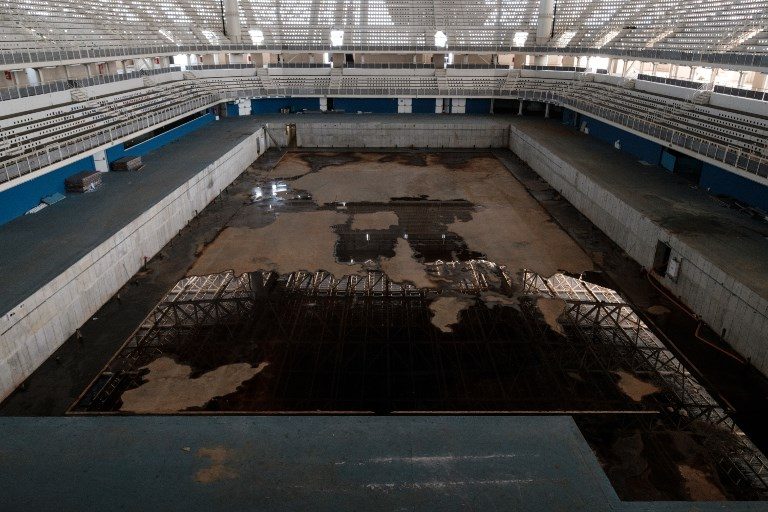SUMMARY
This is AI generated summarization, which may have errors. For context, always refer to the full article.

RIO DE JANEIRO, Brazil – Plagued by violence, white elephant sports facilities and corruption scandals, Rio de Janeiro today is unrecognizable from the feel-good city greeting the world at the Olympics exactly a year ago.
Rio was the first South American city to hold the Summer Games and organizers were credited with staging a successful show – from the moving opening ceremony to the exploits of Jamaican sprinter Usain Bolt and US swimming superman Michael Phelps.
But as soon as the athletes packed their bags and cameras stopped rolling, barely hidden problems erupted.
Eduardo Paes, mayor of Rio during the Olympics, said he had made the city, boosted by the temporary deployment of 50,000 troops, “the safest place in the world.”
Last month, the army had to return, sending some 8,500 soldiers to support Rio’s cash-strapped police in their brutal fight against narco gangs ruling with near impunity in swaths of the city’s favelas.
Muggings have rocketed in richer neighborhoods, parts of the favelas are like war zones, and stray bullets fired from high powered rifles mean that no one is safe.
The last few weeks have seen gunfights spill several times onto the major highway passing the international airport, forcing drivers to stop and hide behind their cars.
Roberto Alzir, head of security strategy for the state of Rio, said the city wished it still had that Olympic-level support from the military.
“Today those reinforcements have left and we have trouble paying our police,” he said.
That empty feeling
Despite promising there’d be no white elephants, authorities have struggled to find uses for the facilities built for the two week Olympics.
Parts of the Olympic Park are now open to public events, but much of the complex is eerily vacant. Last weekend the state-of-the-art velodrome with its wooden track caught fire and was heavily damaged.
The Arena of the Future, where handball games were played, was planned to be dismantled and recycled for three schools in poor neighborhoods. However, budget shortages mean that project has yet to get off the ground.
Mario Andrada, spokesman for the Rio organizing committee, insists that the legacy “is just taking time to put in place.”
A metro line extension and a new rapid bus network are among the tangible benefits for ordinary Rio residents from the Games. However, with hotel occupancy plummeting, unemployment soaring and ever more homeless in the streets, the widespread feeling is of an economy in freefall.
According to the National Business Confederation, 5,000 people got tourism jobs as a result of the Games. But just in the first five months of this year the sector shed 9,000 jobs.
Evicted
There’s particular bitterness from the approximately 3,000 former inhabitants of a favela that was razed to make way for the Olympic Park.
After a high profile fight against eviction, nearly all the inhabitants of Vila Autodromo accepted apparently generous compensation packages and alternative housing, leaving only a handful of holdouts.
But those who moved out to the newly built project, named Parque Carioca, say their new homes are not fit for habitation.
Taxi driver Iran Oliveira, 41, pointed to cracks and damp in the walls and a bathroom where nearly all the tiling has come off.
“We didn’t have much choice because the mayor was putting so much pressure, even threatening to destroy our houses without compensation if we didn’t leave,” the father of four said.
He was assured that he’d have title to the new apartment. However, under the details that he only understood later, he will not have the right to sell the property until the city has finished making payments on the property of 90,000 reais ($30,000).
That’s meant to be complete in 10 years but due to the economic crisis payments are already in arrears.
“We were ripped off,” said Ze Riveiro, another evicted resident of Vila Autodromo.
Meanwhile, the nearby athletes’ village – a brand new tower complex that was planned to be sold after the Games as luxury apartments – sits virtually unused.
Just 10 percent of the apartments have sold, according to Brazilian media reports.
“They demolished our community only because the poor were not allowed to take part in the Olympics,” said the leader of Vila Autodromo’s resistance to eviction, Maria da Penha. – Rappler.com
Add a comment
How does this make you feel?
There are no comments yet. Add your comment to start the conversation.